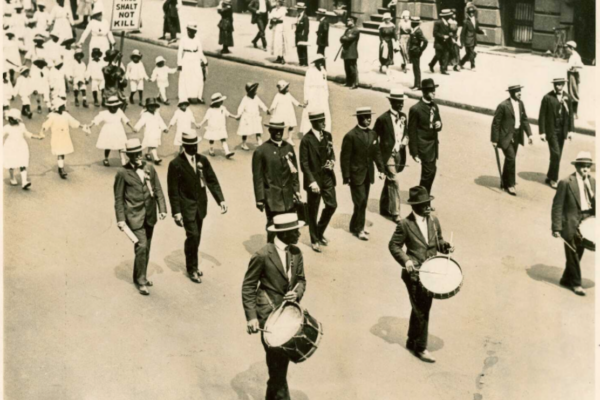
Long Overdue: the Emmett Till Antilynching Act of 2022 and the Church’s Response
May 1, 2023 | Chuggy Ani
On March 22, 1898, journalist and NAACP co-founder, Ida B. Wells, visited the McKinley White House to petition the President for support against white mob violence plaguing the American South and elsewhere. By the late 19th century, lynchings had become a commonplace extra-judicial practice that targeted black men and women who were alleged to have committed offenses, ranging from murder to catcalling a white woman, and everything in between. Lawless mobs whipped into a frenzy would beat, humiliate, and hang alleged offenders, often with those tasked to enforce the rule of law either joining in or standing silently by. The practice became an effective tool to enforce a social hierarchy that favored whites. It would drive millions of black Americans from the South. Ms. Wells and her colleagues’ pleas fell on deaf ears that day, and more than 200 other attempts by lawmakers to classify lynching as a federal crime would fail over the next 122 years.
This would finally change when the Emmett Till Antilynching Act (ETAA), named after a young boy who was brutally beaten and hanged after being falsely accused of whistling at a white woman, was signed by President Biden in March of 2022, making lynching a federal hate crime at last. While lynching had already been criminalized by all states individually, this act of Congress draws attention to the practice’s particularly heinous form of racial injustice and added a layer of prosecution that would invite the involvement of the national government and its resources. The measure passed in the House of Representatives by a vote of 422-3. A similar measure in the Senate passed unanimously. If our country’s laws are reflective of the values that we as Americans hold dear, then through the ETAA, we have finally codified racist vigilante violence as un-American.
Aside from the obvious question of “why did this take so long to enact?,” the other question that ought to tug at the heart of the American Christian is “where was Jesus’ Church in all of this?” No doubt, many brothers and sisters in the faith fought on the side of justice, while too many still participated or were silent (and therefore complicit) in lynchings. So famous was Protestant Evangelical complicity in lynching that Indian philosopher Rabindranath Tagore, when asked about American missionaries, quipped, “So long as this goes on in your land, do you think
you have any Christianity to export?” The same question can be asked of the American Church vis a vis lynching’s parent, slavery; or its less violent sibling, Jim Crow; or perhaps its ill-understood and insidious offspring, structural racism. Hindsight offers today’s Church a harsh view into what followers of Jesus could have done or did not do in the face of glaring injustice. The sinfulness of lynching is exposed all throughout Scripture:
In the prohibition of murder (Exodus 20), the promotion of the sanctity of human life (Psalm 139), the prohibition against bias or partiality (1 Timothy 5:21), and of course Jesus’ imperative to love your neighbor.
That many Christians so blatantly violated God’s commands by participating in lynchings is cause for great lament; that many still deny or minimize the impact of ongoing prejudice is also lamentable. When we reflect on the series of events culminating in Jesus’ crucifixion, some familiar themes become apparent: Rome washed its hands of the matter and instead of enforcing the law, handed Him over to the mob; the mob, whipped into a frenzy, spat on Him, beat Him, defiled Him, and hung Him up to die. In light of His own suffering, we can be assured that Jesus understands the suffering of oppression, shameful mistreatment, powerlessness, and betrayal. We can be assured that God sees the suffering of many Black people innocent of the crimes for which they were lynched, just as God throughout history has heard the cries of the poor, enslaved, and oppressed. We can also be assured that even such a gross injustice as Jesus experienced – an innocent person bearing the punishment of a criminal on behalf of sinful people who were the ones who deserved to die, can have powerful redemptive purpose in history. The lynching of
Black people in American history is not equivalent to the crucifixion of Jesus in its atoning purpose and power; after all, despite having full knowledge of the anguish that awaited Him, Jesus chose to endure this torture. Nevertheless these unjust murders are precious in the sight of
our God (Luke 11:51, Revelation 6:10) and must be to us also.
Is the Church doomed to repeat past sin? Certainly not! Jesus died and rose again to set us free from sin. Yet a lack of vigilance, a low view of racial prejudice as sin, or denial about our own failings in the area of prejudice could perhaps enable ongoing injustice. In embracing Christ as Savior and boasting in the shame of the cross, it’s incumbent on Christians to condemn mob violence and ethnic bigotry, and celebrate when our country enshrines national values such as the Emmett Till Antilynching Act into law.






